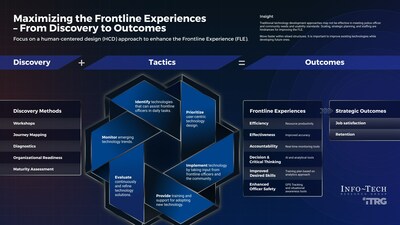The landscape of policing is evolving rapidly as technology and digital transformation continue to drive innovations and enhanced experiences. As the world becomes more interconnected, the importance of enhancing the frontline experience (FLE) in law enforcement cannot be overstated. Embracing new approaches to technology development and implementation becomes crucial to equip officers with the necessary tools and resources to uphold public safety effectively. To help police departments and their technology leaders focus on human-centered design to further enhance the frontline experience for officers, global research and advisory firm Info-Tech Research Group has published new industry research, Maximize the Frontline Experience: The Human Side of Technology in Policing.


Maximizing FLE is important for many reasons, including enhancing police officer job satisfaction and retention. Leading police departments have recognized the importance of developing internal innovation capabilities, such as digital labs, that incorporate modern development practices and approaches such as human-centered design, Agile, DevSecOps, and minimum viable products (MVPs).
“To ensure successful technology development and implementation in policing, there must be a focus on using a human-centered design (HCD) approach. HCD is a creative problem-solving process that prioritizes people’s needs, resulting in innovative solutions tailored to their requirements,” says Vishal Monga, research specialist at Info-Tech Research Group. “Adopting HCD increases the likelihood that technology investments will meet user needs and usability standards, leading to higher user engagement, greater system efficiency, and more satisfied officers.”
According to Info-Tech’s research, improving the relationship between police officers and the communities they serve is a significant priority for police departments. However, several challenges arise in this pursuit, such as the need for innovation to enhance officer efficiency, effectiveness, and safety.
Other challenges include the limitations of traditional technology development approaches, which may not meet the needs and usability standards of officers and communities. Furthermore, the lack of internal innovation capabilities within police departments can lead to ineffective technology development and implementation, and hindrances in scaling, strategic planning, and staffing may also impede the improvement of the FLE.
Siloed organizational structures can also slow down progress. Lastly, the task of simultaneously enhancing existing technologies and developing future ones poses yet another challenge for police departments. Ineffective technology development and implementation can negatively impact FLE. The firm advises that optimizing technology in the FLE is vital for boosting officer job satisfaction and retention.
The new resource outlines Info-Tech’s recommended human-centered design approach that will allow police departments to improve the frontline experience for officers. The approach is broken down below at a high level:
- Identify technologies that can assist frontline officers in daily tasks.
- Prioritize user-centric technology design.
- Implement technology by taking input from frontline officers and the community.
- Provide training and support for adopting new technology.
- Evaluate continuously and refine technology solutions.
- Monitor emerging technology trends.
Info-Tech advises that improving FLE through technology is not solely the responsibility of the CIO. Organizational and cultural enablers are also necessary to ensure the successful digital enablement of police officers.
To learn more about how law enforcement agencies can enhance the frontline experience for their officers through a human-centered design approach, download the complete Maximize the Frontline Experience: The Human Side of Technology in Policing blueprint.
For media inquiries on the topic or to get exclusive, timely commentary from Vishal Monga, a technology and public sector industry expert, please contact [email protected].About Info-Tech Research Group
Info-Tech Research Group is one of the world’s leading information technology research and advisory firms, proudly serving over 30,000 IT professionals. The company produces unbiased and highly relevant research to help CIOs and IT leaders make strategic, timely, and well-informed decisions. For 25 years, Info-Tech has partnered closely with IT teams to provide them with everything they need, from actionable tools to analyst guidance, ensuring they deliver measurable results for their organizations.
Media professionals can register for unrestricted access to research across IT, HR, and software and over 200 IT and industry analysts through the firm’s Media Insiders program. To gain access, contact [email protected].
For more information about Info-Tech Research Group or to access the latest research, visit infotech.com and connect via LinkedIn and Twitter.
SOURCE Info-Tech Research Group